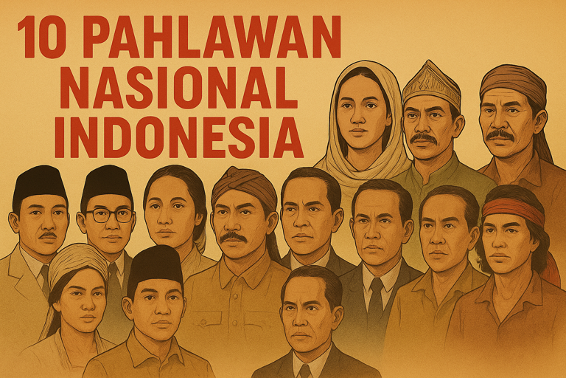NoLimit Indonesia – On the commemoration of Heroes’ Day 10 November 2025, the President of the Republic of Indonesia Prabowo Subianto designated ten figures as National Heroes.
This decision, which is contained in Presidential Decree Number 116/TK/Year 2025, is a form of official state recognition for their various services and struggles, from the battlefield, education, politics, to defending human rights.
10 National Heroes 2025
1. Suharto – Military Strategy and Political Crossroads
Suharto, who now officially holds the title of National Hero, left a strong mark as a military and political figure. His military career reached its peak with the General Strike of 1 March 1949, an action that changed the international perception that Indonesia still had great fighting power.
Not only that, he also led Operation Mandala for the liberation of West Irian in 1962, a military-diplomatic strategy that proved decisive in the nationalization of the region.
On the other hand, his leadership during the New Order era gave rise to political stability and significant economic growth. However, his journey was not free from controversy, especially regarding human rights violations.
Despite the pros and cons, the country considers its strategic contribution to national unity as something worth remembering.
2. Abdurrahman Wahid (Gus Dur) – Democracy, Pluralism and Islamic Education Reform
Meanwhile, KH. Abdurrahman Wahid or Gus Dur is remembered as a leader who opened the doors wide for democracy. As the 4th President, he abolished various discriminatory regulations, defended minorities and fought for civil liberties. Furthermore, his progressive attitude places him as a figure of pluralism who is respected by the world.
It doesn’t stop there, his contribution to Islamic education cannot be ignored. Gus Dur encouraged the modernization of Islamic boarding schools, the integration of general education into the Islamic curriculum, and the formation of an inclusive mindset. Thus, his intellectual legacy became an important part of the development of moderate Islam in Indonesia.
3. Marsinah – Labor Rights Fighter
In the midst of the euphoria of industrialization development in the 1990s, Marsinah’s name emerged as a symbol of worker courage. She opposes company and local government policies regarding minimum wages, while also fighting for women’s rights in the industrial sector. Correspondingly, his courage inspired a wave of demands for worker welfare in the following period.
Unfortunately, his struggle ended tragically after he was found dead after being kidnapped in May 1993. However, his death sparked the national labor movement, forcing the government at that time to make major corrections to labor regulations.
4. Mochtar Kusumaatmadja – Architect of International Maritime Law
As Minister of Justice and Minister of Foreign Affairs, Mochtar Kusumaatmadja played an important role in strengthening Indonesia’s position in the world. He designed the concept of Wawasan Nusantara and the maritime law system which later became the basis for determining Indonesia’s maritime territory. More than that, his thinking provides a legal framework that emphasizes the sovereignty of archipelagic countries.
Not only that, he also brought Indonesian diplomacy into the modern era through a soft diplomacy approach. His expertise in international law made him a respected figure at the United Nations.
5. Rahmah El Yunusiyyah – Pioneer of Girls’ Schools in Southeast Asia
Rahmah El Yunusiyyah’s role was very revolutionary for Indonesian women. At the beginning of the 20th century, when education for women was still considered taboo, she founded the Diniyah Puteri College in Padang Panjang. With this step, Rahmah broke the cultural domination that limited women’s access to education.
Through this institution, Rahmah not only educated women, but also created a modern Islamic education model which was later adopted by neighboring countries. In other words, his ideas transcend the boundaries of space and time.
6. Sarwo Edhie Wibowo – Firm Commander in Times of Crisis
General Sarwo Edhie Wibowo is known as a disciplined and firm figure who plays a role in crucial military operations. Apart from being an important figure in maintaining the country’s stability during the political transition, he was also involved in developing the younger generation through military educational institutions. In line with this, he is seen as a figure who shaped the character of Indonesian military discipline.
On the other hand, some historical records mention his involvement in counter-guerrilla operations which were full of polemics. Even so, the country considers the aspect of its contribution to defense stability as a big factor in determining its title.
7. Sultan Muhammad Salahuddin – The Enlightening King of Bima
From the eastern region of Indonesia, Sultan Muhammad Salahuddin is remembered as a champion of local education and diplomacy. He built religious and public schools in Bima, expanded people’s access to literacy, and at the same time instilled moderate thinking in social life. Therefore, its role is so large in shaping the social structure of modern Bima.
Apart from that, it also played an important role in safeguarding local sovereignty from colonial pressures in its transition period. Until finally, the legacy of his leadership became a pillar of culture and education in West Nusa Tenggara.
8. Syaikhona Muhammad Kholil – Teacher of Indonesian Ulemas
This great cleric from Bangkalan was the teacher of many important national figures, including KH. Hasyim Asy’ari. Syaikhona Kholil is known not only as an expert in religious knowledge, but also as a figure who incorporated the national spirit into Islamic boarding school education. Not only did he teach knowledge, he also instilled a spirit of resistance against colonialism.
In this way, his work was not only influential in the scientific field, but also in the formation of the national character of the first generation of Indonesians.
9. Mr
Long before Indonesia was founded as a nation, Tuan Rondahaim Saragih had fought against Dutch domination in Simalungun. He is known as the “Napoleon of Batak Land” thanks to his bold and innovative military strategy. Not surprisingly, he has become a role model for the local community in defending territorial sovereignty.
More than that, he also fought for the existence of Simalungun culture so that it would not be eroded by colonialism. Therefore, this recognition confirms that local struggles are an inseparable part of national history.
10. Sultan Zainal Abidin Syah – Guardian of Archipelago Integration from Tidore
As leader of the Tidore Sultanate, Zainal Abidin Syah made an important contribution in maintaining the integrity of the eastern region of the archipelago. His role in Papuan diplomacy and inter-kingdom relations marks his visionary leadership. With inclusive leadership, he strengthened Tidore’s position in regional political dynamics.
Apart from that, he also carried out local bureaucratic reforms and strengthened religious education in the North Maluku region. Thus, the legacy of his reign remains relevant for the development of eastern Indonesia to this day.
Analysis of Determining National Figures for 2025 on Social Media
Awarding the title of national hero sparked debate about how the nation evaluates historical figures. On the one hand there are groups that emphasize economic development, while on the other hand there are those who demand justice for victims of human rights violations.
This decision also has an impact on history education, because teachers and the media must convey the complete context so that the younger generation understands both sides of the nation’s historical journey.
Based on data collected from the platform IndSight period 1 October – 10 November 2025 Show that topic “National Hero Title” recorded 135,322 thousand conversations during 1 October – 10 November 2025 with 10,273 thousand engaged users, and a balanced distribution of sentiment between 15,720 thousand positive conversations and 11,163 thousand negative conversations.
After this peak, the trend decreased although it again showed an increase towards the end of the month. Overall, this data shows that the issue of establishing the title of National Hero triggered a spike in public attention ahead of the official announcement period.
Common Threads from Various Ages
Through this determination, the state emphasizes that heroism is not awarded based on just one type of struggle. There are those who fight through weapons, there are those who work through their minds, there are also those who risk their lives for the rights of the little people. In other words, each figure has a contribution in a different frame of struggle.
Therefore, the 10 National Heroes of 2025 are a reflection of the diversity of values that built Indonesia: courage, intelligence, humanity, firmness and commitment to truth.

News
Berita
News Flash
Blog
Technology
Sports
Sport
Football
Tips
Finance
Berita Terkini
Berita Terbaru
Berita Kekinian
News
Berita Terkini
Olahraga
Pasang Internet Myrepublic
Jasa Import China
Jasa Import Door to Door
Download Film
